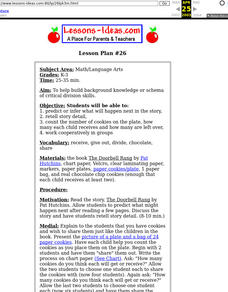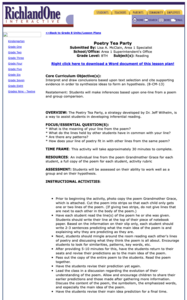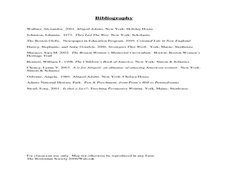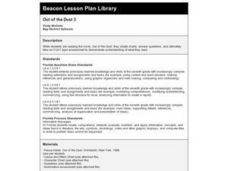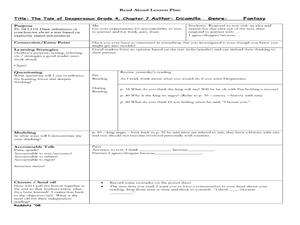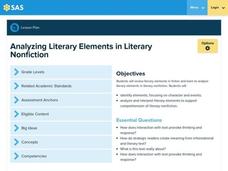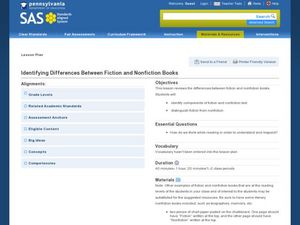Visa
Make It Happen: Saving for a Rainy Day
Every little penny counts, especially when it comes to saving for emergencies or long-term goals. Pupils evaluate different saving and investment strategies, such as a CD or money market account, through worksheets and by...
Curated OER
Lesson Plan #26
Students build background knowledge or schema of critical division skills by predicting or inferring what will happen next in the story, retelling story detail, and counting the number of cookies on the plate.
Curated OER
Poetry Tea Party
Studetns make inferences based upone one-line poetry and group comparison. In this poetry lesson, 9th graders read strips from a poem and write prediction sentences for the poem. Students read each other's poetry lines and then read the...
Curated OER
Biographies
Students read a biography and discuss what defines a biography. Students choose a biography of their own interest to read and write a report about one of the people in the biography. Reports are shared with classmates.
Pennsylvania Department of Education
Comparing Key Ideas and Details in Fiction and Nonfiction
Learners recognize the differences between fiction and nonfiction texts. For this genre study lesson, students discuss what nonfiction means and write the definition. Learners listen to a read aloud and vote whether the text is fiction...
Curated OER
Look Alikes
Third graders compare and contrast the physical features of parents and offspring. In this life science lesson, 3rd graders classify a set of animal pictures according to their similarities. They share and explain their work in class.
Curated OER
Jazz it Up!
Learners research the history and contributions of Jazz in their local environments. They then design and create a wide variety of presentations to share with the class using as many mediums as possible.
Curated OER
Abigail Adams: Integrating Social Studies and Language Arts
Third graders increase reading strategies while learning about Abigail Adams and her role in history. In this Abigail Adams lesson, 3rd graders read about the American Revolution and Abigail Adams using all the balanced literacy...
Curated OER
Freedmen's Bureau
Students examine the African American experience after they received their freedom after the Civil War. They complete a Mind Map, read and analyze a poem, and write a paragraph using key vocabulary words. They analyze the impact of the...
Curated OER
Transcendentalism and Epiphany in Ray Bradbury's Dandelion Wine
Twelfth graders examine the characteristics of transcendentalism. In this transcendentalism lesson, 12th graders determine what this type of writing entails before reading a passage from, Ray Bradbury's, Dandelion Wine. They cite three...
Curated OER
How Africans Became Slaves for the Colonists
Students complete a t-chart identifying the advantages and disadvantages of having indentured servants. In groups, they research the use of serfs and slaves in various cultures and share their responses. To end the lesson plan, they...
Curated OER
Getting Ready to Become An Adult
Students participate in a problem solving activity and discuss how effective their solution was. In this getting ready to become an adult lesson, students read Ta-ne-e-ka and use guiding questions to address the relationships in...
Prestwick House
Teaching Shakespeare: Sonnet 73
It's that time of year to consider how Shakespeare selects his images and structures his Sonnet 73 to develop the meaning of the poem. Class members examine the rhyme scheme, the indented lines, the conceit, and the images used in each...
Polar Trec
What Can We Learn from Sediments?
Varve: a deposit of cyclical sediments that help scientists determine historical climates. Individuals analyze the topography of a region and then study varve datasets from the same area. Using this information, they determine the...
Curated OER
Go Jump In The Lake!
Students experiment with local lake water to determine the health of the lake waters. They explore the human impact on the lake water, hypothesize and share inferences in a scientific report.
Curated OER
"Julie of the Wolves"
Fifth graders research life in Alaska and compare life there to their lives in this lesson. They read "Julie of the Wolves." They research through the novel and other reference books facts about the Alaskan climate and geography. They...
Curated OER
Out of the Dust 3
Students read the novel, Out of the Dust, and complete a cause and effect chart and a character chart. When the book is completed, they answer review questions.
Curated OER
The Tale of Despereauz
Fourth graders read text and draw inferences or conclusions about the text. In this reading lesson, 4th graders discuss their opinions on what was read and state why they think that way to a partner.
Curated OER
Archeology of the Future
Pupils are introduced to the basic vocabulary of archeology. Using the vocabulary, they classify artifacts and make inferences about their uses. In groups, they create a chart for the criteria needed to analyze artifacts and share them...
Pennsylvania Department of Education
Analyzing Literary Elements in Literary Nonfiction
Fourth graders identify the literary elements of a nonfiction text. In this literary elements lesson, 4th graders read the text Piano Starts Here--The Young Art Tatum and fill in a chart that includes the events from the book....
Curated OER
Teaching Imagery with Gary Paulsen
Middle schoolers read excerpts from memoirs written by Gary Paulsen as examples of how to write a narrative piece. They identify figurative language used and then they write a memoir of their own that contains imagery and figurative...
Curated OER
The Poet's Message-"The Colored Soldier" by Langston Hughes
High schoolers analyze the poem, "The Colored Soldier" by Langston Hughes to gain a greater experience of how poets use language to create meaning, influence thinking and thus become pioneers of change in American society. They work on...
Curated OER
Identifying Differences Between Fiction and Nonfiction Books
Learners explore the differences between fiction and non-fiction book. In this genre study lesson, students read examples of fiction and non-fiction and identify the characteristics of each genre. Learners list the characteristics on a...
Curated OER
Leo and the Butterflies
Second graders read a book entitled, "Leo and the Butterflies." They discuss the rainforest and butterflies. Students observe the pictures and predict what will happen in the story. They examine reading strategies for decoding unfamiliar...



